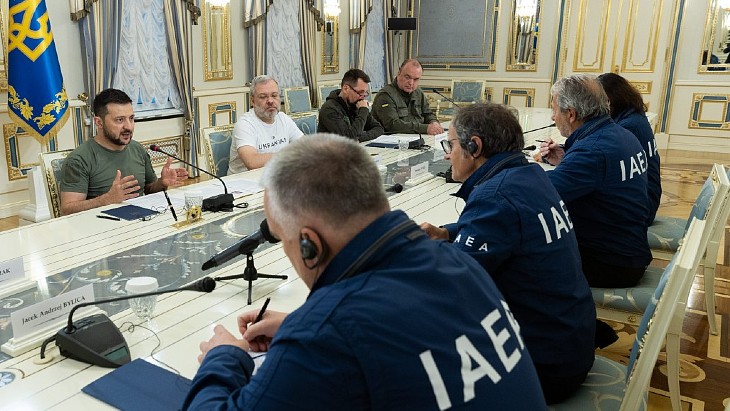Russian President Vladimir Putin on Wednesday issued a decree in which the Zaporizhzhia nuclear power plant was transferred to Russian control and to oversight by the Russian nuclear regulator, as part of the annexations he has announced of parts of Ukraine. (Read more about the decree and the reaction to it here)
However, Ukraine has rejected the decree as a "null and void", has rejected the annexations, and nuclear power plant operator Engeroatom says it continues to own and run the plant, which has been occupied by the Russian military since early March, but which has continued to be operated by its Ukrainian staff.
Grossi travelled to Ukraine on Thursday, with plans to also visit Russia in the coming days, as part of continuing efforts to establish a safety and security zone around the plant. The aim is to try to minimise the risk of conflict harming the security of the site, parts of which have been hit by shelling over the past few months, which the two sides blame on the other.
The decree announced by the Russian president came hours before Grossi held talks with the Ukrainian president, during which the president thanked Grossi "for the fact that your employees work on the ground with Ukrainian specialists" and also for his help in the release on Monday of the director general of the nuclear power plant, Ihor Murashov, who had been detained by Russian forces last Friday. Zelensky also said that it remained his view that the only way to ensure the full safety of the plant was for the Russian forces to withdraw from it, and its full demilitarisation.
In a media conference after the talks Grossi said: “We want this war to stop, the war should stop immediately and of course the position of the IAEA is that this facility (Zaporizhzhia) is a Ukrainian facility.”
Grossi was also asked whether he would boycott any move to force the plant’s employees to transfer to the newly created Russian operator. He said: "I can neither boycott or play along, I have to do the right thing and the right thing in this case is first of all to look after the security, the safety and the well-being of the staff and, when it comes to the contractual changes that may be coming as a result of the announcement, that is something that I will have to be discussing in Russia in the next few days. There is not much clarity about the extent of the proposed changes. But for us, it is obvious that since this is a Ukrainian facility the ownership is on Energoatom. Any change will be a complex issue and we are going to try to know more about it and the consequences."
He added: "We are an international organisation, we are guided by international law. Annexations are not accepted under international law, the United Nations Charter and other instruments. So this is very clear, but there are practical consequences and I am dealing with those as well."
Asked how "tough" he would be when speaking to the Russian side, Grossi said: "It’s not a matter of being tough or of being soft. The IAEA as an international organisation has a mission and has a legal parameter to do it. We are being consistent, we are not changing what we have said and what needs to be done - everybody agrees on one thing, which is that a nuclear accident must be prevented by all means."
He said he continued to work on establishing the safety and security zone around the plant, saying that it was not something "that can be formed out of thin air - this is an unprecedented situation".








_94566.jpeg)






